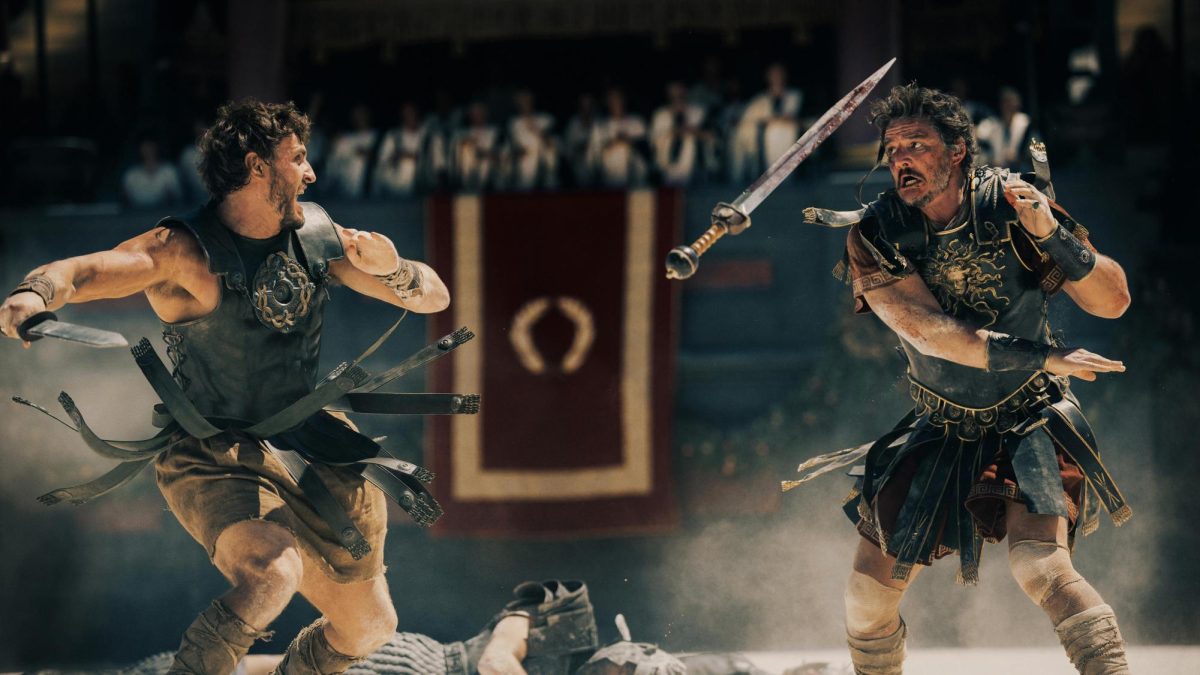Following the peculiar 2023 biopic, “Napoleon,” director Ridley Scott delivered a sequel to one of his most famous movies with “Gladiator II.” With the original “Gladiator” being 24 years old, it was a little odd hearing that a sequel was coming, considering the ending of the first movie, but the sequel delivers on a very similar experience of humanity with a slave, turned, gladiator, and a gladiator having wider aspirations for the fate of ancient Rome.
The film begins 16 years after the original film ended, in 200 A.D. in Numidia, a North African territory. Hanno (Paul Mescal), a soldier, prepares a stronghold with his wife, Arishat (Yuval Gonen), as Roman invaders arrive by ship.
The battle is lost as the Romans, led by General Acacius (Pedro Pascal), capture the remaining Numidian soldiers as slaves, including “Hanno,” who is revealed to be Lucius Verus Aurelius, the son of Maximus (Russell Crowe) and Lucilla (Connie Nielsen) from the original “Gladiator” film, who fled Rome as a boy after the events of the first movie to escape assassins trying to kill him, as he was the only living heir to the throne and the grandson of the former emperor.
Lucius is chosen by Macrinus (Denzel Washington), a powerful landowner with political ties who turns slaves into gladiators to fuel an ulterior motive wanting Rome for himself.
The film does well in being a successor to the original film, as we are given another story of a gladiator who is at first reluctant and denies his lineage, but in the end wants to fulfill Maximus’ dream of making Rome for the people. But, for better or for worse, the film follows an outline that is almost hitting the same beats as the original.
It starts with Lucius wanting revenge against General Acacius for leading the siege that killed his wife, but there are twists, turns and bigger things at stake when Lucius progresses in the gladiator arena.
From beginning to end, the film has similar traits of the original, of a gladiator aspiring to becoming the linchpin to dismantle Rome for the people, by surviving the challenges the arena throws at Lucius, while humanizing him and the people he meets. It reaches the borderline of almost being the same movie, if it wasn’t for the new cast of characters, which shine throughout the film.
Paul Mescal does a great job of playing Lucius, as his background of being a trusted officer in Numidia and his rough upbringing of fleeing Rome makes his physique and ability to hold his own in a fight become believable. As mentioned, his denial of his destiny is a great arc that is seen throughout the film and his intellectual side also surprises characters in the film, which adds to the depth of the character.
The supporting characters almost steal the show. Denzel Washington does a phenomenal job, playing the role of Macrinus, as being a powerful political figure and quickly rises in power and being the right-hand man of the twin emperors, Emperor Geta and Emperor Caracalla, played by Joseph Quinn and Fred Hechinger respectively.
Washington does a stellar performance, as Macrinus is forceful, powerful and cunning, while maintaining the commanding flair he is known for in his roles. The two emperors that Quinn and Hechinger play are almost opposites of each other, but still reign over Rome with absolute tyranny. Emperor Geta is collected while wanting controlled chaos for Rome to rule above all civilizations, while Emperor Caracalla acts on impulse and always wants bloodshed and everything right on that second.
The dynamic of Lucius and Macrinus wanting the same thing which is to dismantle Rome, to rid it of its long tyranny of emperors is one of the more interesting aspects of the film, as Lucius wants to return it to the people, while Macrinus agrees with the tyranny, but wants to start a new reign and lineage starting with him.
This is why the film succeeds in being an action-packed experience for anyone itching to see gladiator arena fights, and thankfully the story is developed enough to be interesting and to follow along, but isn’t game changing and doesn’t excel in what the original “Gladiator” film did years ago, since this film feels like a rehash at points. The angle of humanizing the gladiator is similar but a lot of aspects of the film like the politics, tyrannical emperors, the people of Rome siding with the gladiator seem too safe, and should’ve made more of an effort to make risks with the story itself for the sake of not feeling too similar.
However, there are amazing and death-defying moments, especially with the naval battle inside The Colosseum where two ships fight in shark-infested waters. Surprisingly, this isn’t one of the many historical inaccuracies the film has been known for. However, it didn’t take me out of the movie, as I always assume some kind of “movie magic” or “truth-stretching” are in most of these period piece films.
All the characters meet just ends to their arcs in this film, as they serve the plot and the story of Lucius succeed, including the callbacks to the original film, with Lucius’ memories of meeting Maximus setting the tone for this journey towards accepting his destiny. A lot of coups and plots happen throughout the film amongst the fights in The Colosseum, which gives the film more depth than a typical action movie, though it is unlikely to win any awards for storytelling.
“Gladiator II,” is a great action movie to watch and enjoy. From great performances to decent writing, the film is definitely worth watching, especially for fans of the original film.






